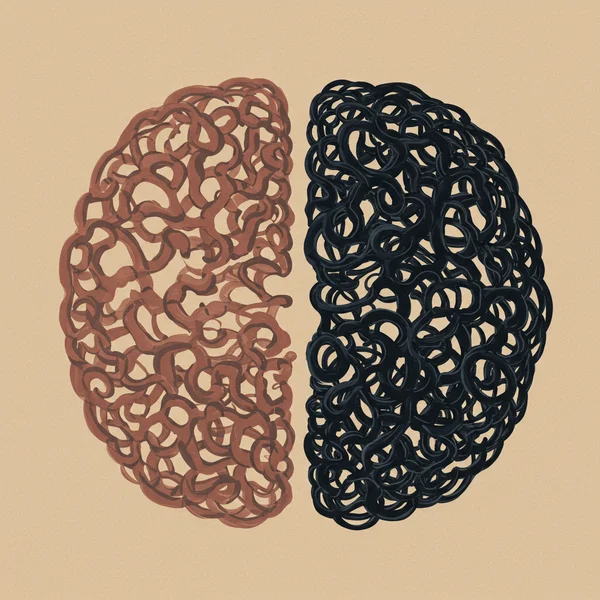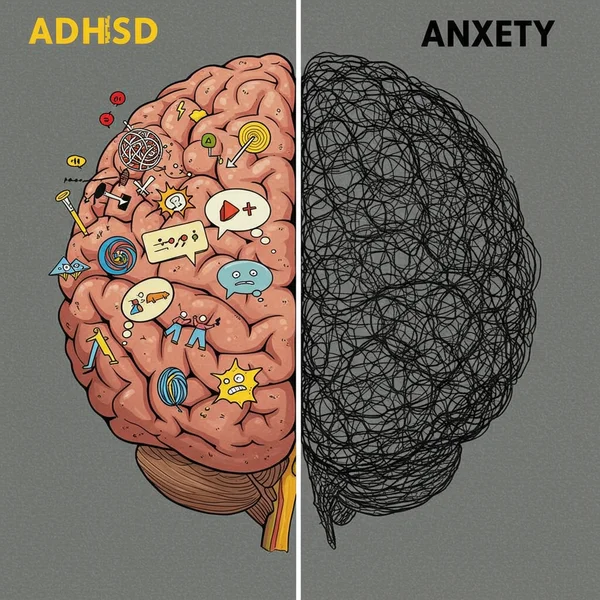ADHD & Anxiety Quiz: Understanding the Overlap
August 4, 2025 | By Julian Navarro
Feeling overwhelmed, scattered, and constantly on edge? It’s a bewildering experience, isn't it? You might be caught in a confusing whirlwind of symptoms, wondering if it's ADHD, anxiety, or perhaps both. Many people feel caught in this confusing overlap, as the two conditions share a surprising amount of common ground. This guide is here to help you untangle the threads, understand the key distinctions, and see how a free adhd quiz can be a valuable first step toward clarity. Are you searching for answers with an adhd or anxiety quiz? Let's explore this complex relationship together and find your path forward. An initial screening tool can provide the starting point you need.

ADHD vs. Anxiety: Distinguishing Core Symptoms
At a glance, the restlessness of ADHD can look a lot like the agitation of anxiety. Similarly, the inattention from an overactive ADHD mind might be mistaken for the distraction caused by constant worry. To truly understand what you might be experiencing, it's essential to look at the root of the symptoms. While they can appear similar on the surface, their underlying causes are quite different.
Core ADHD Symptoms: Beyond Just "Lack of Focus"
Attention-Deficit/Hyperactivity Disorder (ADHD) is a neurodevelopmental condition, meaning it stems from brain structure and function differences that have been present since childhood. It is primarily characterized by a persistent pattern of inattention and/or hyperactivity-impulsivity that interferes with functioning or development. The core symptoms include:
- Inattention: Difficulty sustaining focus on tasks, being easily distracted, forgetfulness in daily activities, and trouble with organization.
- Hyperactivity: Feeling an inner restlessness, fidgeting, inability to stay seated, or excessive talking.
- Impulsivity: Acting without thinking, interrupting others frequently, and having difficulty waiting for one's turn.
Anxiety Manifestations: The Nature of Worry and Fear
Anxiety, on the other hand, is primarily an emotional response rooted in fear and apprehension about future events. While everyone experiences anxiety, an anxiety disorder involves excessive and persistent worry that is difficult to control and impacts daily life. Common signs of anxiety include:
-
Excessive Worry: Constant, intrusive thoughts about worst-case scenarios.
-
Physical Symptoms: A racing heart, shortness of breath, trembling, sweating, and muscle tension.
-
Avoidance: Actively staying away from situations, places, or people that trigger anxious feelings.
-
Restlessness: Feeling keyed up, on edge, or unable to relax due to worry.

The Symptom Overlap: Why It's Hard to Tell the Difference
The confusion between ADHD and anxiety is understandable because they create a significant mental health overlap. Many of their outward signs look identical, which can make self-assessment challenging. A person struggling with either condition might report feeling overwhelmed, having trouble sleeping, and experiencing difficulties at work or in relationships. It’s the reason behind the symptom that often holds the key.
Difficulty Concentrating: Shared Manifestations
Both ADHD and anxiety can severely impact focus. If you have ADHD, you may have difficulty concentrating because your brain is constantly seeking new stimulation, making a boring task feel physically uncomfortable. In contrast, if you have anxiety, you may be unable to concentrate because your mind is consumed by intrusive worries and fears, pulling your attention away from the present moment. The result is the same—an incomplete task—but the internal experience is vastly different.
Executive Dysfunction: Navigating the Underlying Mechanisms
A key concept in understanding ADHD is executive dysfunction. This refers to challenges with the brain's self-management system, affecting planning, organization, time management, and emotional regulation. This is why you might find yourself procrastinating if you have ADHD—not out of laziness, but because initiating the task feels neurologically impossible. While anxiety can also lead to procrastination, it's typically driven by a fear of failure or imperfection, not an inherent difficulty with task initiation itself. For more clarity on your symptoms, a confidential quiz for adhd can be a helpful resource.

Comorbid ADHD: When ADHD and Anxiety Co-Occur
To add another layer of complexity, ADHD and anxiety frequently exist together. This is known as comorbidity, where an individual has two or more conditions simultaneously. Research shows that a significant percentage of adults with ADHD also have a co-occurring anxiety disorder. When this happens, the symptoms can influence and intensify each other, making life feel even more challenging.
Dual Diagnoses: Signs You Might Be Experiencing Both
How do you know if you might be dealing with dual diagnoses? One clue is when treating one condition doesn't resolve the symptoms of the other. For example, if you find strategies to manage your anxiety but still struggle with chronic disorganization and forgetfulness, underlying ADHD might be present. Another sign is when your anxiety seems directly tied to your ADHD symptoms, such as feeling anxious about deadlines you constantly miss or social situations where you fear interrupting others. Exploring this with an adult adhd quiz can offer preliminary insights.
Emotional Regulation: The Impact of Dual Diagnoses on Daily Life
Living with both ADHD and anxiety can be a constant battle. The impulsivity of ADHD might lead to decisions that trigger anxiety, while the worry from anxiety can paralyze the ADHD brain, leading to inaction and more stress. This cycle can take a significant toll on self-esteem and overall well-being. Difficulties with emotional regulation are common, making it hard to manage frustration, disappointment, and stress in a healthy way.
How an Anxiety or ADHD Quiz Can Provide Initial Clarity
Navigating this confusion alone can feel isolating. While no online tool can provide a medical diagnosis, a well-designed anxiety or ADHD quiz serves as a powerful first step. It can help you organize your thoughts and identify patterns in your experiences, empowering you to have a more productive conversation with a healthcare professional. Taking a private, free ADHD quiz can be an excellent way to begin.
Preliminary Self-Assessment: The Role of Self-Assessment in Your Journey
Think of a preliminary self-assessment as a structured symptom checker. Instead of swimming in a sea of confusing feelings, a quiz guides you through specific questions based on established criteria, like the DSM-5. Our free adhd quiz helps you examine behaviors related to focus, restlessness, and impulsivity. The results can provide a clearer picture of whether your symptoms align more closely with the typical profile of ADHD, giving you a concrete starting point for further exploration.
Professional Consultation: From Quiz Results to Next Steps
Your quiz results are not a final answer but a signpost on your journey to understanding. If your results from an adhd online quiz suggest potential ADHD traits, the next crucial step is to seek professional consultation. Share your results with a doctor, psychiatrist, or therapist. This information can help them conduct a comprehensive evaluation, consider all factors, and guide you toward an accurate diagnosis and appropriate support plan.

Your Path to Clarity: Taking the Next Step
Understanding the intricate relationship between ADHD and anxiety is the first step toward gaining control over your life. While symptoms can be confusingly similar, recognizing their different roots is key to finding the right strategies for management. You don't have to navigate this uncertainty alone.
If you see yourself or a loved one in this description, taking our confidential and science-based online ADHD quiz can provide the valuable initial insights you need. Take the next step with our free ADHD quiz, designed for adults, teens, and children. Gain the clarity you deserve today.
Disclaimer: This article is for informational purposes only and does not constitute medical advice. The online quiz is a screening tool and not a substitute for a professional diagnosis. Please consult a qualified healthcare professional for any health concerns.
Frequently Asked Questions About ADHD & Anxiety Symptoms
Can an online quiz truly tell if I have ADHD or anixety?
No online tool can provide a formal diagnosis. However, a scientifically-grounded adhd self-assessment quiz like ours can be an incredibly useful screening tool. It helps identify potential ADHD-related traits based on established criteria, giving you a clearer idea of whether you should pursue a professional evaluation.
What are the key differences between ADHD and anxiety symptoms?
The main difference lies in the why. Inattention in ADHD often comes from a brain that is under-stimulated and seeking novelty. Inattention in anxiety typically stems from a mind preoccupied with worry. Similarly, restlessness in ADHD is an internal, often lifelong need to move, while in anxiety, it's usually a physical reaction to fear or stress.
Does having ADHD mean I'll also experience anxiety?
Not necessarily, but it is very common. The daily challenges of living with untreated ADHD—such as missing deadlines, social missteps, and feeling out of control—can be a significant source of stress and anxiety. This is known as secondary anxiety.
How accurate are free ADHD quizzes for differentiating anxiety?
A high-quality quiz focuses specifically on the core diagnostic criteria for ADHD. While it can't rule out anxiety, it can accurately highlight the presence and severity of ADHD-specific symptoms. Our free quiz is designed to give you a reliable signal about potential ADHD, which is distinct from a general anxiety screener.
What should I do after taking an ADHD quiz if I suspect anxiety?
Use the results as a starting point. Take your insights from our online ADHD quiz to a healthcare professional and discuss all of your symptoms—both those that point to ADHD and those that feel like anxiety. A professional can conduct a thorough evaluation to understand the full picture and recommend the best course of action.